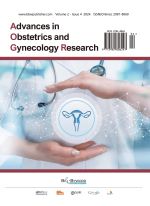Abstract
Objective: To investigate the clinical efficacy of Dienogest (DNG) combined with Wenjing Tang Formula in patients with uterine adenomyosis. Methods: 60 patients with adenomyosis were randomly divided into Group A and Group B. Group A patients received continuous oral treatment with DNG 2 mg/d for 3 months, while Group B patients were given Wenjing Tang Formula based on Group A treatment. The treatment effect, size of adenomyoma and incidence of adverse reactions were compared between the two groups. Results: The total effective rate of treatment in Group B was 96.67%, which was significantly higher than 73.33% in Group A (P < 0.05); the size of uterine adenomyoma in Group B was significantly smaller than that in Group A, with a significant difference (P < 0.05). In terms of the incidence of adverse reactions, group B was 6.67%, which was significantly lower than 26.67% in group A (P < 0.05). Conclusion: The treatment of adenomyosis of the uterus via dienogest combined with the addition and subtraction of Wenjing Tang showed higher therapeutic efficacy and significant tumor shrinkage, and at the same time, it could reduce the incidence of adverse reactions, which has a good prospect of clinical application, and it is recommended to be promoted for use in clinical practice.
References
Bulun SE, Yildiz S, Adli M, et al., 2021, Adenomyosis Pathogenesis: Insights from Next-Generation Sequencing. Human Reproduction Update, 27: 1086–1097.
Yu O, Schulze-Rath R, Grafton J, et al., 2020, Adenomyosis Incidence, Prevalence and Treatment: United States Population-Based Study 2006–2015. American Journal of Obstetrics and Gynecology, 223: 94.
Yu N, Chen X, 2019, Observation on the Clinical Efficacy of Mifepristone Combined with Wenjing Tang Formula on Adenomyosis of the Uterus. Journal of Practical Medical Technology, 26(2): 214–215.
Berek JS, 2018, Gynaecology (15th ed.). People’s Health Press, Beijing, 95–96.
Xiang L, Wang W, Li Z, et al., 2022, Clinical Observation on the Adjuvant Treatment of Infertility with Diminished Ovarian Reserve Function by Warm Menstrual Soup. Chinese Pharmaceutical Industry, 31(16): 103–106.
Zhao S, Li J, Liu E, et al., 2021, A Randomized Controlled Study on the Treatment of Functional Menstrual Disorders of Cold-Congealing and Blood-Stasis Type by Single Decoction of Jia-Minus Wen-Jing Tang and Combined Decoction of Granules. World Journal of Integrative Chinese and Western Medicine, 16(4): 772–776.
Lu J, Cheng X, Lu S, et al., 2022, Effect of Jiawei Wenjing Tang on the Intervention Effect and Changes of Serum TXB_2/6-Keto-PGF1a, t-PA/PAI-1 in Patients with Menstrual Disease with Cold Coagulation and Blood Stasis. Hebei Journal of Traditional Chinese Medicine, 37(6): 42–45.
Mao F, 2020, Effect of Warm Menstrual Soup on Serum Prostaglandin E2, Interleukin 17, Vascular Endothelial Growth Factor, and Uterine Artery Blood Flow Parameters in Patients with Endometriosis. China Maternal and Child Health, 35(21): 3959–3962.
Li X, Liu J, Mu Y, et al., 2017, Study on the Diastolic Effect and Mechanism of Wuzhuine on Smooth Muscle of Isolated Rat Uterus. Chinese Pharmacist, 20(10): 1713–1717.
Li X, Zhao J, Wu W, et al., 2023, Progress in the Study of Chemical Composition and Pharmacological Effects of Gui Zhi. Journal of Traditional Chinese Medicine, 51(5): 111–114.
Liang J, 2016, Effect of Wenjing Tang on Endometrial Morphology and Pregnancy in Infertile Patients with Endometriosis. Journal of Modern Integrative Chinese and Western Medicine, 25(29): 3259–3261.
